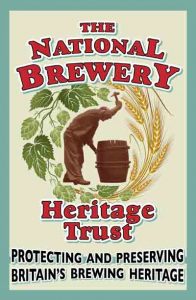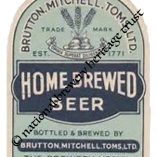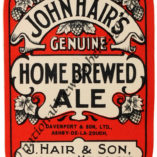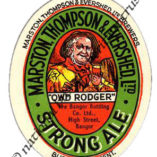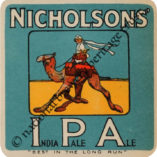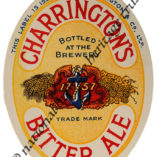Friday 24th July 1914 was an important date for the employees of Bass Ratcliffe & Gretton. Starting at 3.40am a series of 14 specially chartered trains took over 7000 brewery workers and their families from Burton railway station on a day trip to the seaside.
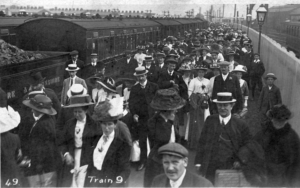
Bass employees at Blackpool station 1911
The tradition started in 1865 when 1000 people filled 2 trains to go to Liverpool and from 1883 it became an annual event. Legislation did not allow for workers to have paid holiday until 1938, so this would have been an important date. Over the years the company gained a reputation for its excursions, and popular destinations included Liverpool and Great Yarmouth. At its peak in 1900 over 11,000 passengers travelled to Blackpool.
Scarborough train
Scarborough was the choice for the summer of 1914 in what would turn out to be the last of the company seaside trips. The trip made headlines in the Scarborough Post, suggesting that over 7000 people would be coming to town. The first train left Burton Railway Station at 3.40am, arriving at Scarborough at 7.30am. It was filled with the company blacksmiths, coppersmiths, painters, platelayers, plumbers, tailors, cloggers and wheelwrights. Trains were timetabled eery 10 minutes with later departures filled with joiners, the workers from the railway department and clerks, as well the gardeners and farm workers from the Bass family estate at Rangemore. The latest train was reserved for Mr Walters and friends. William
Walters was the company Railway Traffic Manager and the mastermind behind the trips.
Excursion handbook
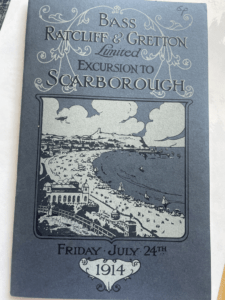 Every adult received a copy of the handbook with all the practical details they needed to make the most of their day, from the times of their trains to the location of the toilets at the station. It was a tradition started in 1893 for a trip to Great Yarmouth.
Every adult received a copy of the handbook with all the practical details they needed to make the most of their day, from the times of their trains to the location of the toilets at the station. It was a tradition started in 1893 for a trip to Great Yarmouth.
It also acted as a tourist guide to the town with very many details of all of the delights of Scarborough, “The Queen of Watering Places” from the Piers and the harbours to the gardens and the amusement arcades. Special concerts were arranged in the Grand Hall, and variety shows in the large Concert Hall. Mindful of the limited experience of the average brewery worker to the sea, the handbook also contained practical advice for swimmers: “Do not bathe immediately after a hearty meal and after bathing take a brisk walk.”
The final page of the handbook outlined all the place that the tourists could get Bass on draught and finished with a cheery word from William Walters. “I trust that every Employee and everyone else going with us, will again cheerfully display that spirit of good fellowship that has always characterised Bass’ outings.”
“I trust that every Employee and everyone else going with us, will again cheerfully display that spirit of good fellowship that has always characterised Bass’ outings.”
End of an era
Just 11 days later the British government declared war and 5 months after the Bass trip Scarborough, Whitby and Hartlepool suffered a bombing raid by the Imperial German Navy, killing 122 civilians and wounding 443.
In March 1915 the Bass Directors resolved that “the Workmen’s Excursion be discontinued for the present year on account of the difficulties of the Railway Company occasioned by the war with Germany.”
In June 1915 they decided that “the Trip should be abandoned but in its place each employee have a Saturday Holiday.” Those on the payroll received a half day pay plus a gift of 2 to 5 shillings dependent on their age and seniority in the company.
Mr Walters retired in December 1915 after 50 years’ service and that was the end of the great seaside excursion.
If you enjoyed this, you may like to read this article: RAF 48 Squadron Always over the drink!
